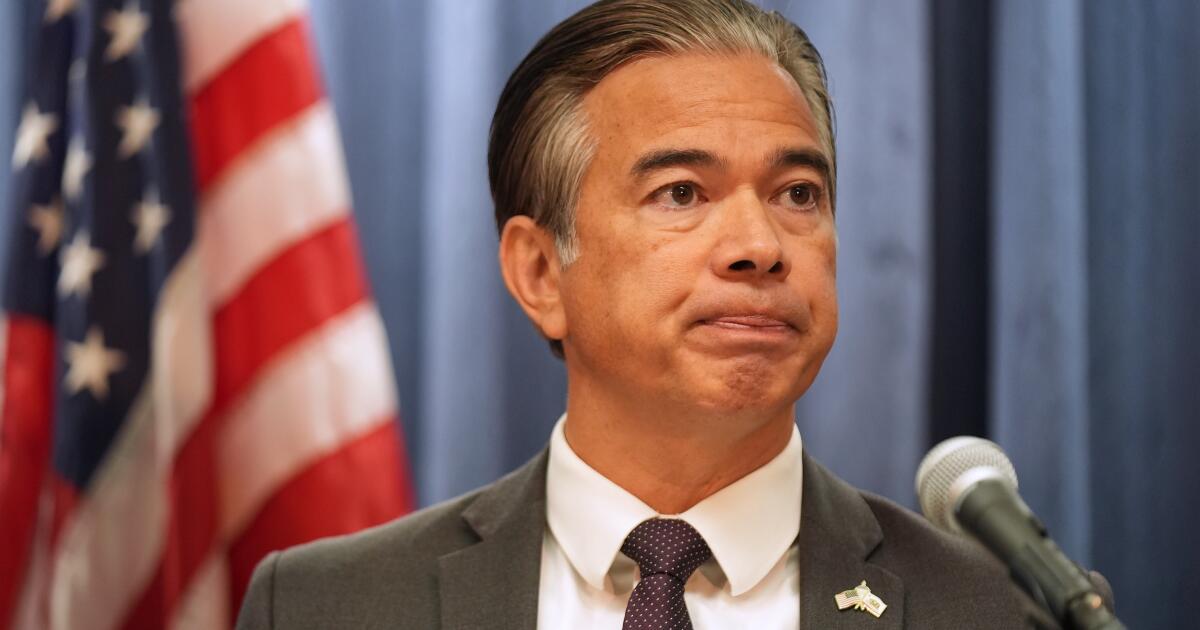California, other states sue over Trump administration’s latest cuts to HIV programs
California and three other states sued the Trump administration Wednesday over its plans to slash $600 million from programs designed to prevent and track the spread of HIV, including in the LGBTQ+ community — arguing the move is based on “political animus and disagreements about unrelated topics such as federal immigration enforcement, political protest, and clean energy.”
“This action is lawless,” attorneys for California, Colorado, Illinois and Minnesota said in a complaint filed in federal court in Illinois against several Trump administration departments and officials, as well as President Trump himself.
The U.S. Centers for Disease Control and Prevention funding had been allocated to disease control programs in all four states, though California Atty. Gen. Rob Bonta’s office said California faces “the largest share” of the cuts.
That includes $130 million due to California under a Public Health Infrastructure Block Grant, which the state and its local public health departments use to fund their public health workforce, monitor disease spread and respond to public health emergencies, Bonta’s office said.
“President Trump … is using federal funding to compel states and jurisdictions to follow his agenda. Those efforts have all previously failed, and we expect that to happen once again,” Bonta said in a statement.
Health and Human Services Secretary Robert F. Kennedy Jr., one of the named defendants, has repeatedly turned his agency away from evidence-backed HIV monitoring and prevention programs in the last year, and the Trump administration has broadly attacked federal spending headed to blue states or allocated to initiatives geared toward the LGBTQ+ community.
The White House justified the latest cuts by claiming the programs “promote DEI and radical gender ideology,” but did not explain further. Health officials have said the cuts were to programs that did not reflect the CDC’s “priorities.”
Neither the White House nor Health and Human Services immediately responded to requests for comment on the lawsuit Wednesday.
The Los Angeles County Department of Public Health said the cuts would derail an estimated $64.5 million for 14 different county grant programs, resulting in “increased costs, more illness, and preventable deaths,” the department said.
Those programs focus on response to disasters, controlling outbreaks of diseases such as measles and flu, preventing the spread of diseases such as West Nile, dengue and hepatitis A, monitoring and treating HIV and other sexually transmitted diseases, fighting chronic illnesses such as diabetes and obesity, and supporting community health, the department said.
Those cuts would also include about $1.1 million for the department’s National HIV Behavioral Surveillance Project, which is focused on detecting emerging HIV trends and preventing outbreaks.
Dr. Paul Simon, an epidemiologist at the UCLA Fielding School and former chief science officer for the county’s public health department, said slashing the program was a “dangerous” and “shortsighted” move that would leave public health officials in the dark as to what’s happening with the disease on the ground.
Considerable cuts are also anticipated to the City of Long Beach, UCLA and nine community health providers who provide HIV prevention services, including $383,000 for the Los Angeles LGBT Center’s community HIV prevention programs, local officials said.
Leading California Democrats have railed against the cuts. Sen. Alex Padilla (D-Calif.) said the move was an unlawful attempt by Trump to punish blue states that “won’t bend to his extremist agenda.”
“His message to the 1.2 million Americans living with HIV is clear: their lives are not a priority, political retribution is,” Padilla said in a statement.
The states argue in the lawsuit that the administration’s decision “singles out jurisdictions for disfavor based not on any rational purpose related to the goals of any program but rather based on partisan animus.”
The lawsuit asked the court to declare the cuts unlawful, and to bar the Trump administration from implementing them or “engaging in future retaliatory conduct regarding federal funding or other participation in federal programs” based on the states exercising their sovereign authority in unrelated matters.

